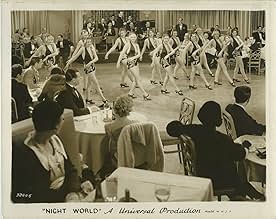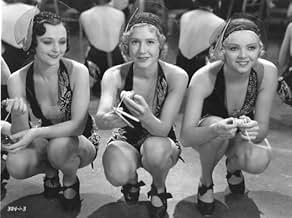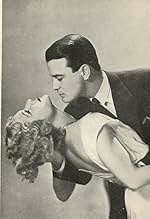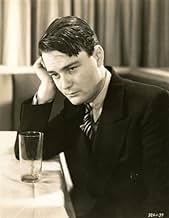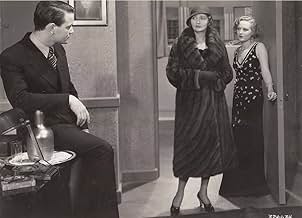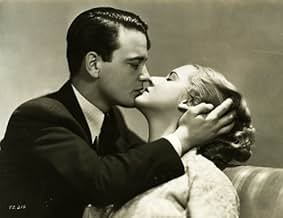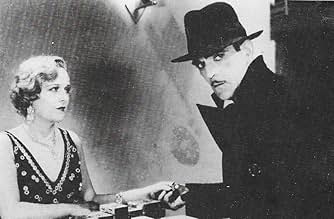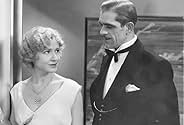Aggiungi una trama nella tua linguaStory of the goings-on at a Prohibition-era nightclub.Story of the goings-on at a Prohibition-era nightclub.Story of the goings-on at a Prohibition-era nightclub.
- Regia
- Sceneggiatura
- Star
Alice Adair
- Chorine
- (non citato nei titoli originali)
Consuelo Baker
- Chorus Girl
- (non citato nei titoli originali)
Frank Beal
- Bit
- (non citato nei titoli originali)
Louise Beavers
- Maid
- (non citato nei titoli originali)
Recensioni in evidenza
Fun, saucy, fast-moving and short, Night World is a neat little movie from the early thirties, before Prohibition was repealed, when Hoover was still in the White House; and with a Depression still new there was yet a Gatsby mood in the cities.
The credits of this movie are unusual. Busby Berkeley did the choreography. Alfred Newman composed what music there is. The cast is oddball for any sort of film, but especially peculiar for this kind: Lew Ayres, Mae Clarke, Boris Karloff, Hedda Hopper, George Raft and Jack La Rue. Director Hobart Henley handles his material extremely well, and gives it pace and energy. There is joy, sadness, corruption, disillusionment and heartbreak in the movie, and the ending is bittersweet but not downbeat.
The credits of this movie are unusual. Busby Berkeley did the choreography. Alfred Newman composed what music there is. The cast is oddball for any sort of film, but especially peculiar for this kind: Lew Ayres, Mae Clarke, Boris Karloff, Hedda Hopper, George Raft and Jack La Rue. Director Hobart Henley handles his material extremely well, and gives it pace and energy. There is joy, sadness, corruption, disillusionment and heartbreak in the movie, and the ending is bittersweet but not downbeat.
Fun, somewhat bizarre pre-coder about one night at a nightclub and the assorted people there. Worth a look for the great cast and the odd mixture of gangster movie and musical comedy. Lew Ayres plays a rich guy drowning himself in drink because his mom killed his dad. Mae Clarke plays a showgirl who helps him. The two fall in love quickly, Old Hollywood style. They have a cute chemistry. Great support from Boris Karloff, Clarence Muse, George Raft, Bert Roach, Dorothy Revier, and, hey, there's future gossip columnist Hedda Hopper. Also features a forgettable number choreographed by Busby Berkeley. Ayres is fine but upstaged by the rest of the cast, especially Clarke and Muse. It's from Universal although it seems a bit like it's trying to be a WB movie. A good way to pass an hour. There's also a Frankenstein joke, although Karloff is not in that particular scene.
Poor Mae Clark was in loads of films yet is most known for getting a grapefruit in the kisser from James Cagney in 'Public Enemy.' So it's nice to see her in a part with a few more brains. She is just part of an odd mixed-salad of a cast. Some, like Boris Karloff as an awkwardly gangly night-club owner, and Bert Roach as a silly drunk, seem to be in strange waters. Others, like Lew Ayers and George Raft, get roles typical of their young careers. Though she has only one scene in this very short film, Hedda Hopper steals the show as the world's worst mother.
The only character to really warm to is The Doorman, Tim Washington (Clarence Muse). He is clearly in a horrible situation which those around pity at best and ignore at worst. So many African-American roles in the white films of the '30s are painful to watch, but Muse brings something special to this thankless part.
Cinematographer Merritt Gerstad shows an inventive eye both in the opening montage and in scenes that would otherwise be nothing to look at. And of course, we get brief Busby Berkeley numbers, which would never really work in a night club, but allowances must be made for Hollywood.
The only character to really warm to is The Doorman, Tim Washington (Clarence Muse). He is clearly in a horrible situation which those around pity at best and ignore at worst. So many African-American roles in the white films of the '30s are painful to watch, but Muse brings something special to this thankless part.
Cinematographer Merritt Gerstad shows an inventive eye both in the opening montage and in scenes that would otherwise be nothing to look at. And of course, we get brief Busby Berkeley numbers, which would never really work in a night club, but allowances must be made for Hollywood.
Universal in the early 30's is mainly remembered as the home of the horror film, but in fact they ventured into other kinds of films as well. This fast little precode seems like it might have come from Warner Bros., but instead it is the product of Universal. Boris Karloff plays "Happy" the owner of a night club and husband to an unfaithful wife, not that he doesn't have a roving eye himself. George Raft shows up briefly in the film as a tough guy who has an eye for chorus girl Mae Clark. Finally there is Lew Ayres as the son of a prominent family whose mother has just recently shot his father dead and been acquitted. This is not the mom of a heart of gold that you see in so many depression era films, and the young man spends night after night in Happy's club trying to forget his troubles. Add in a snappy Busby Berkeley number and Happy's run-in with the suppliers of his bootleg whiskey and you have a very fast moving little precode. The film is visually interesting too, with an introduction similar to 1929's "Broadway", also by Universal, minus the silver-skinned giant calling the city to awaken and join him in his debauchery. Highly recommended, that is, if you can ever find a copy.
I had never seen this film and Lew Ayres was a friend of mine years ago and came to lecture to my film class at the University of Arizona ca. 1975. He was a deeply religious man, a conscientious objector during World War II and ambulance driver and former husband of Ginger Rogers and Lola Lane of the fabulous Lane Sisters. He said that the breakup of the marriage with Ginger was his fault because she got more famous than he and he couldn't deal with it. He was a thoughtful, intelligent and decent guy and very gentle in real life but he caught fire on screen or in live performance. When he WAS acting, he was all show business and you needed to get out of the way of him because of the intensity of what he was doing. Then when he was done and the public spotlight would go away, he'd return to being the great guy he was. I liked him enormously and he had just finished directing his religious film Altars of the World about his trips all over the world to study various religions and their belief in a guiding spirit. I'm not a religious guy but he believed in treating everyone with the spirit that he had found and that feeling just made him nice to be around.
This movie features also a winning performance from Mae Clarke who shows that she can actually dance pretty well. She was a natural actress, not a raving beauty, but someone who radiated attractiveness from deep within and it spilled out onto the screen. She should have been much more famous. Pity she's known for getting that grapefruit shoved in her face by Cagney because here she delivers a solid and winning performance. George Raft appears briefly and does that gangster coin flipping stuff that he would do so much in his forties movies. Clarence Muse is absolutely wonderful as the black doorman of Happy's Club and projects a terrific emotional range, conveying a good bit of what it must have really been like to be black back then in a white man's world..
The screenplay is solid and there's a Busby Berkeley dance number. It's small scale and lacks the wonder of his work at Warner Brothers or the amazing color kaleidoscope he did at Fox in The Gang's All Here in 1943--don't miss that one!! But it's still a fun interlude to see Busby in his early period a little bit post Whoopee and Palmy Days. There's also Boris Karloff, fresh from his triumph as the Frankenstein monster the year before and one of the characters actually makes an inside joke in the film, referring to Frankenstein. Karloff's British accent doesn't quite fit well with the thug part he has to play but he's still pretty effective and Hedda Hopper, later to be a feared gossip columnist who wrote Under Hedda's Hat in syndication everywhere, does a terrific turn as Lew Ayres' murderous mother.
All in all it is a night club Grand Hotel with the various problems of many characters, good and bad people, interweaving nicely and very well written. It's a short film so you needn't invest much time but it moves along swiftly and ends with a running gag about Schenectady, New York. I give it seven stars and especially enjoyed seeing Lew Ayres who, if one takes the drinking part away in the film, was essentially playing the man he really was, a highly decent guy who had an up and down career but a career that spanned more than 65 years in the movies and tv and near the end of his life he was playing the older crush of a young Mary Tyler Moore on her tv show and being convincing about it. The man was really special from top to bottom.
Lo sapevi?
- QuizMae Clarke was sick during most of the production of The Impatient Maiden (1932) and this film, which were made back-to-back. At the end of this film, she was so sick that her face swelled up and she was having hallucinations. She was able to go for detox treatments in Palm Springs and Pasadena.
- Citazioni
'Happy' MacDonald: Never give a sucker an even break.
Ed Powell: I never give anybody an even break.
- ConnessioniFeatured in The Universal Story (1996)
I più visti
Accedi per valutare e creare un elenco di titoli salvati per ottenere consigli personalizzati
- How long is Night World?Powered by Alexa
Dettagli
- Data di uscita
- Paese di origine
- Lingue
- Celebre anche come
- Mujeres que matan
- Luoghi delle riprese
- Azienda produttrice
- Vedi altri crediti dell’azienda su IMDbPro
- Tempo di esecuzione
- 58min
- Colore
- Proporzioni
- 1.37 : 1
Contribuisci a questa pagina
Suggerisci una modifica o aggiungi i contenuti mancanti

